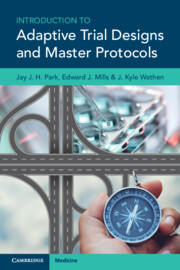Book contents
- Introduction to Adaptive Trial Designs and Master Protocols
- Introduction to Adaptive Trial Designs and Master Protocols
- Copyright page
- Content
- Preface
- About the Authors
- Part I Introduction and History of Clinical Trial Research
- Part II Basic Ingredients for Adaptive Trial Designs and Common Types
- Chapter 3 Characteristics and Principles of Adaptive Trial Designs
- Chapter 4 Common Types of Adaptive Trial Designs
- Chapter 5 Clinical Trial Simulations
- Part III Basic Ingredients for Master Protocols
- Part IV Case Studies of Adaptive Trial Designs and Master Protocols
- Part V A Practical Guide to Adaptive Trial Designs and Master Protocols
- Index
- References
Chapter 5 - Clinical Trial Simulations
from Part II - Basic Ingredients for Adaptive Trial Designs and Common Types
Published online by Cambridge University Press: 20 March 2023
- Introduction to Adaptive Trial Designs and Master Protocols
- Introduction to Adaptive Trial Designs and Master Protocols
- Copyright page
- Content
- Preface
- About the Authors
- Part I Introduction and History of Clinical Trial Research
- Part II Basic Ingredients for Adaptive Trial Designs and Common Types
- Chapter 3 Characteristics and Principles of Adaptive Trial Designs
- Chapter 4 Common Types of Adaptive Trial Designs
- Chapter 5 Clinical Trial Simulations
- Part III Basic Ingredients for Master Protocols
- Part IV Case Studies of Adaptive Trial Designs and Master Protocols
- Part V A Practical Guide to Adaptive Trial Designs and Master Protocols
- Index
- References
Summary
In this chapter, we discuss the use of simulations for clinical trials. Simulation in statistics generally refers to repeated analyses of randomly generated datasets with known properties. Clinical trial simulation is required to explore, compare, and characterise operating characteristics and statistical properties of adaptive and other innovative trials with complex designs. Clinical trial simulation is an important tool that allows for comparison of different design choices during the planning stage to enhance the quality and feasibility of the trial. While simulations are most frequently used in adaptive and other complex trial designs, they can be applied to fixed trial designs.
- Type
- Chapter
- Information
- Publisher: Cambridge University PressPrint publication year: 2023



